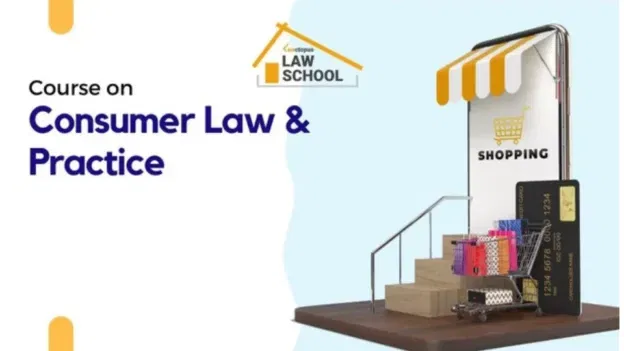About the Course
Every time we buy groceries or donate our salaries to Amazon after being enticed by all the ‘super saver sales’ and ‘up to 90% discounts’ or go to the dentist or consult a lawyer, we are governed by consumer laws.
As a lawyer or lawyer to be, this course helps you assert your rights, and prepare your defence (should you find yourself representing the falsely accused manufacturer/producer/trader/service provider) by helping you navigate through the Consumer Protection Act passed by the Parliament in 2019 which became effective in 2020.
As a consumer, now that it’s easier for you to fight for your rights with the advent of e-filing and virtual hearings, it becomes all the more important to know what they are and how to do that.
The latest amendments in the Consumer Laws governing the country operate on the “Caveat Venditor” principle, which shifts the onus onto the seller by incorporating e-commerce within the jurisdiction of the Consumer Fora, introducing punishment for misleading advertisements and the concept of product liability among other provisions.
About Lawctopus Law School
Conceptualized and kick-started in May 2019, and formally launched in March 2020, Lawctopus Law School has taught a wide range of practical skills to over 17000+ law students, young lawyers, professionals, academicians, and business people in the last 18 months.
Over 2000 students have rated our courses and the average rating is 92.6/100 call our online courses a ‘warm’ learning experience!
At LLS, our courses are developed by subject matter experts (practitioners and academicians) and these courses are a mix of rigorously researched reading modules, recorded lectures by industry experts, weekly live sessions by experts, assignments (with personalized feedback), special, add-on career webinars, and the now famous ‘warmth and care’ of LLS.
In fact, our courses on Legal Research and Writing, Contract Drafting and Negotiation, Litigation Basics, IPR (with separate modules too for Trademarks, Copyrights, and Patents), Applying for LLM Abroad, Legal Notice Drafting, Contract Life Cycle Management, Mooting, and test prep mocks have transformed how people look at legal education and online legal education.
How will this course help you?
- You will get to understand and analyze the laws relating to consumer disputes and settlements in India.
- You will be able to understand the roles of various authorities in dealing with consumer disputes.
- The course will give you a practical understanding of the procedure governing consumer disputes starting with a complaint to the redressal of the grievance.
- You will also learn about the recent changes like e-commerce, and product liability introduced by the Consumer Protection Act, 2019.
Structure of this Course
The course has been designed to give you a foundational and smooth understanding of the Consumer Protection Act, 2019 with the help of real-life illustrations. The course will equip you with the requisite skill-set to understand the procedure related to the practice of Consumer Laws in India and apply the law to the facts.
The course contains 5 modules:
Module 1 : Introduction
- Course Overview
- Introduction to Consumer Protection Act, 2019
- Important Definitions in CPA, 2019
- Authorities under CPA, 2019
This Module will get you acquainted with the history and basics of Consumer Laws in India and give you an overview of the entire course.
Module 2 : Know Your Rights, Know the Law
- Different remedies available to Consumers
- Jurisdiction, Fees and the limitation period for filing a complaint
- Proper Nomenclature in Consumer Proceedings
This Module will help you learn about consumer rights and the various kinds of remedies that consumers could avail in case of a dispute as provided under the Consumer Protection Act, 2019.
Module 3 : Consumer Court 101
- Drafting of a Complaint
- Procedure after Filing the Complaint
- Mediation (ADR)
- Types of orders that may be passed.
This Module will help you understand the manner in which a complaint is to be drafted and the procedure thereafter. You will also get to learn how to draft a reply and strategize the defence in a consumer dispute. It also talks about Mediation as recently introduced by the Consumer Protection Act, 2019.
Module 4 : Appeal to Caesar
- Appellate, Review &Revision Proceedings
- Transfer Proceedings and Enforcement of Consumer Orders.
This Module will take you through the provisions relating to appeal, review and revision as provided under the Consumer Protection Act, 2019. You will also get to learn about the transfer of consumer cases and the enforcement of consumer orders.
Module 5 : Digital Age & Way Forward
- E-Commerce (Download a free resource on this here)
- Product Liability
- Misleading Advertisements
This Module talks about the emerging concepts in the Consumer Laws in India and the way forward.
Self-Assessments: Each Module carries a set of 5 self-assessment questions helping you retain the most important take-aways.
Compulsory Assignment
There will be a set of practical questions based on real-life situations, and you will be required to answer them as lawyers/in case you are coming from a non-law background, you will be required to answer the questions as consumers.
Who can enrol for this course?
- Undergraduate students of law.
- Anybody looking to make a career in Consumer Law Practice
- Young lawyers (in-house counsels, litigators and those working in law firms)
- Consumers
Course Fee
INR 3800 inclusive of GST
Duration and Mode of learning
- Completely online and self-paced
- Recorded video lectures
- Text-based modules and reading resources
- Online-based, faculty monitored forum for doubt resolution and peer-to-peer learning
- 1 Compulsory Assignment (submit the assignment anytime within the 2 months of registration, and it will be evaluated within 2 weeks of submission)
Assignment and Certification
- In order to receive the certificate, you need to submit the compulsory assignment (Instructions to submit the assignment are given in the assignment doc itself)
- Upon submission of assignment, it will be evaluated within 2 weeks and grades will be released along with personalised feedback.
- If you receive an orange, green, or yellow grade, you will receive the completion certificate.
- If you receive the red grade, you will be given a chance to redo the assignment and improve your grade.
- Completion certificates will be given within 7 days of release of grades
Course Duration and Access
You’ll have access to this course for 12 months from the date of registration.
And while you can complete this course at your own pace, we recommend that you completed this course within 8 weeks.
Giving ourselves a fixed timeframe to complete things increases the chances of getting things done.
Contact
If you have any questions, please leave a comment on this post or email at courses@lawctopus.com





Responses